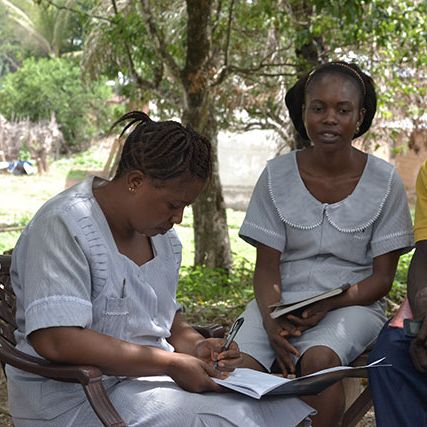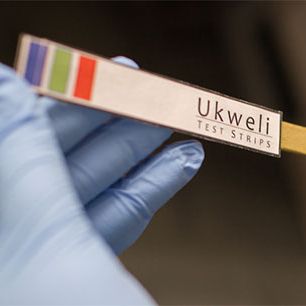Lehigh student team secures funding from Canadian government and philanthropic foundations to improve women’s health care in Sierra Leone
An interdisciplinary team of students and faculty from Lehigh University is working to create real change for rural areas of Africa where women’s health issues plague families and communities.
Lehigh’s ‘Ukweli’ team has been named as recipients of funding from Grand Challenges Canada, as well as the Venturewell program backed by the Lemelson Foundation. Working with World Hope International, a Christian relief and development non-governmental organization (NGO), the Lehigh team will develop and study optimal distribution methods for Ukweli Test Strips in rural areas of Sierra Leone.
The Lehigh team’s efforts build on previous work done by a team from the Humanitarian Engineering and Social Entrepreneurship (HESE) program at Penn State on test strips to screen women for urinary tract infections (UTIs) in developing countries. These test strips can be manufactured for less than two cents each by stamping an assay onto filter paper using a $5 foam stamp.
The student team consists of three Lehigh women: bioengineers Natalee Castillo '19 and Morgan Gillies '20 along with behavioral neuroscience major Cassidy Drost '20 of Lehigh’s College of Arts and Sciences. Recent Penn State bioengineering graduate Gabrielle Gundermann is currently in Sierra Leone as part of the project, as well.
Khanjan Mehta, Lehigh’s current vice provost of creative inquiry and former director of PSU’s HESE program, is coordinating the effort. The team is conducting research on the test strips this semester under the watchful eye of Dr. Lori Herz, who serves as associate chair of Lehigh’s Department of Bioengineering.
According to the team, pregnant women are vulnerable to UTIs, particularly in sub-Saharan Africa, where 30-50 percent of pregnant women will contract a UTI. UTIs often go undiagnosed because of barriers to testing that include cost, accessibility and social stigma. For a pregnant woman and her growing fetus, this is dangerous: an undetected UTI can spread to the kidney and bloodstream and can cause premature labor, slow intra-uterine growth, low birth weight or spontaneous abortion.
The project will focus on finding the best entry point for test strips into the existing healthcare system to treat women quickly and decrease the risk of early labor. An E-Team grant from VentureWell is supporting the development and field-testing of the test strips in Sierra Leone.
According to the December 18 press release from Grand Challenges Canada, the Lehigh project is among 21 recipients of this support, which “extends innovative forms of health-related lifelines to some of humanity’s most acutely impoverished, neglected and vulnerable women and girls.”
Funded by the Government of Canada and other partners, Grand Challenges Canada supports innovators with bold ideas that integrate science, technology, social and business innovation. One of the largest impact-first investors in Canada, and with a feminist investment approach, Grand Challenges Canada has supported a pipeline of over 800 innovations in more than 80 countries. To learn more, read the full press release from Grand Challenges Canada.
According to its Web site, VentureWell seeks to “cultivate a pipeline of inventors, innovators, and entrepreneurs driven to solve the world’s biggest challenges and to create lasting impact.” VentureWell, formerly known as the National Collegiate Inventors and Innovators Alliance, is backed by the Lemelson Foundation, a private 501(c)(3) philanthropy founded in 1993 by inventor Jerome H. Lemelson and his wife Dorothy to support and celebrate innovation and inventors.



